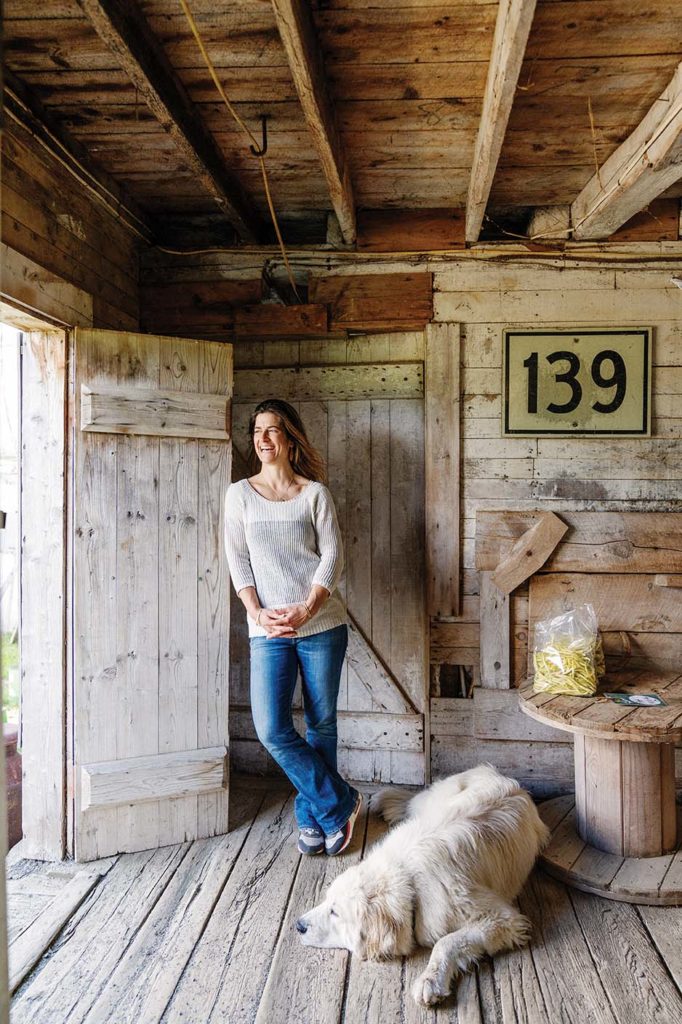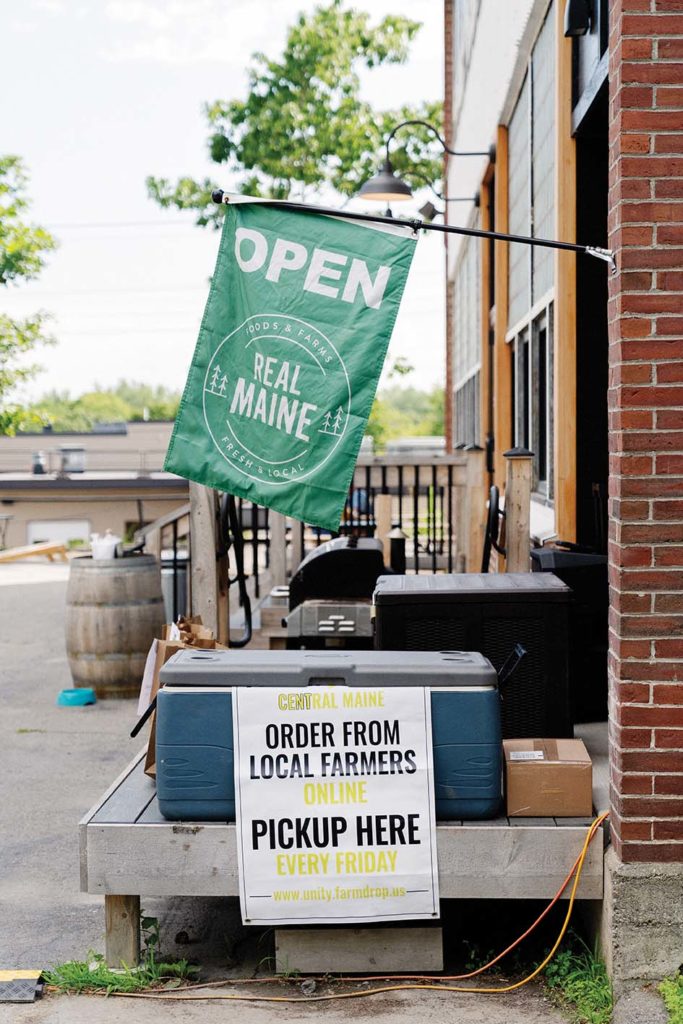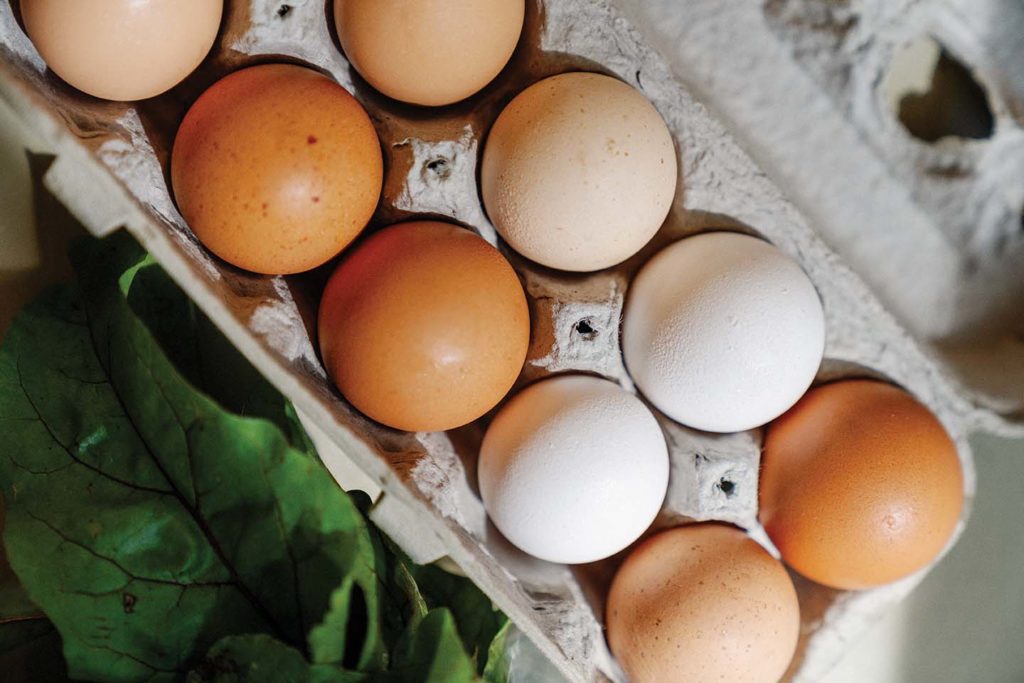The Startup Reinventing Maine’s Farmers’ Markets
With its online platform, FarmDrop is helping farms access customers and reduce food waste.

Hannah Semler and Kelin Welborn share a mission to create thriving local food systems. Welborn has put countless volunteer hours into working with regional gleaning organizations, and Semler has worked to solve food insecurity problems in her home state of Maine and around the globe. So, when the opportunity came to take on a project that could enhance this work through technology, they both jumped at it.
The project, FarmDrop, allows groups of local producers to create regional online farmers’ markets. Once a week farmers open their virtual doors to ordering over a few days. On the day of the “drop” they bring their preordered products to a central location where they package each customer’s order, which might include heirloom tomato seedlings, fresh-baked breads, pasture-raised meats, and locally roasted coffee.

Jesse Michaud at the Farm Drop fulfillment and pick up location in Unity, ME 
Tom Roberts at the Farm Drop fulfillment and pick up location in Unity, ME
The idea began on a smaller scale in 2011, when Mary Alice Hurvitt and her son, George, devised this way to support local farms and offer more fresh produce through the winter at their Blue Hill Wine Shop. After a few successful years of operating the program, they were ready to pass on the reins. In 2016 Semler took over running the Blue Hill FarmDrop as part of her then-role with Healthy Acadia, a public health organization serving Washington and Hancock Counties. Welborn had connected with Semler while researching ways technology could better support local foods and organize gleaning efforts, which is when people harvest and donate produce that won’t be sold. Semler, who also works as a consultant to farm and food businesses to help them reduce waste and hosts the podcast What Is American Food?, told Welborn about her vision for expanding FarmDrop and convinced her to join.
“After talking about it we thought, ‘This could help so many more communities,’ and we never looked back,” says Welborn, who is a graphic designer, creative director, and owner of Welborn Design. They saw that an expanded FarmDrop platform could not only be the link to farmers and their local communities but also do more to reduce waste, since producers only harvest what is ordered instead of speculating about how much they’ll need to display at a market or farm stand.
Semler and Welborn officially took the helm of the online marketplace as its cofounders in 2018. They fine-tuned the software to be able to add more locations, and created a platform where farmers could learn valuable marketing skills, like taking photographs of their product and writing descriptions.

The Farm Drop pick up location at Outland Brewery in Pittsfield, ME 
Farm Drop Co-founder Hannah Semler at Heald Farm, a pick up location in Troy, ME
Other farmer groups soon joined, such as Central Maine FarmDrop in Unity, a town of around 2,000 that struggled to maintain its own farmers’ market despite an abundance of farms. Unity farmers often traveled great distances to larger towns and cities that host markets, and left their neighbors without access to their products.
One of Central Maine FarmDrop’s managers, Kari Hulva, says the model is like Amazon or Hannaford-to-Go for local foods. “The information and technology allow us to communicate in a way that wasn’t really feasible before,” he says.
Although Central Maine FarmDrop began in 2018, its list of participating producers nearly doubled (to around 25) during the pandemic, when national food supply chains began collapsing. FarmDrop added new locations as consumers sought out local foods. It now has eight markets in Maine and two in New York. Each FarmDrop site is run by a nonprofit focused on food security, like Healthy Acadia, and the $5 customer fee per order typically goes to its programs.
Semler acknowledges local food can often feel unaffordable to many community members, and wants to change that. This summer they launched a program that allows farmers to sell excess products to nonprofits like food pantries. FarmDrop will add an EBT payment option in the fall, and is considering a scaled pricing system.
FarmDrop plans to expand throughout New England next year, with a focus on partnering with farming communities of color, new American farming communities, and urban farming projects, says Semler. She envisions the platform as not only a storefront but also a resource to support farm businesses and the communities they grow in. “We want to develop a holistic marketplace that feels like home to everyone,” says Semler.

Read more business stories:
- Claiming Space at the Table

- How to Keep Your Houseplants Alive This Winter

- How to Winter in Maine

- 9 Creative Craft Coffees to Mix Up Your Morning


